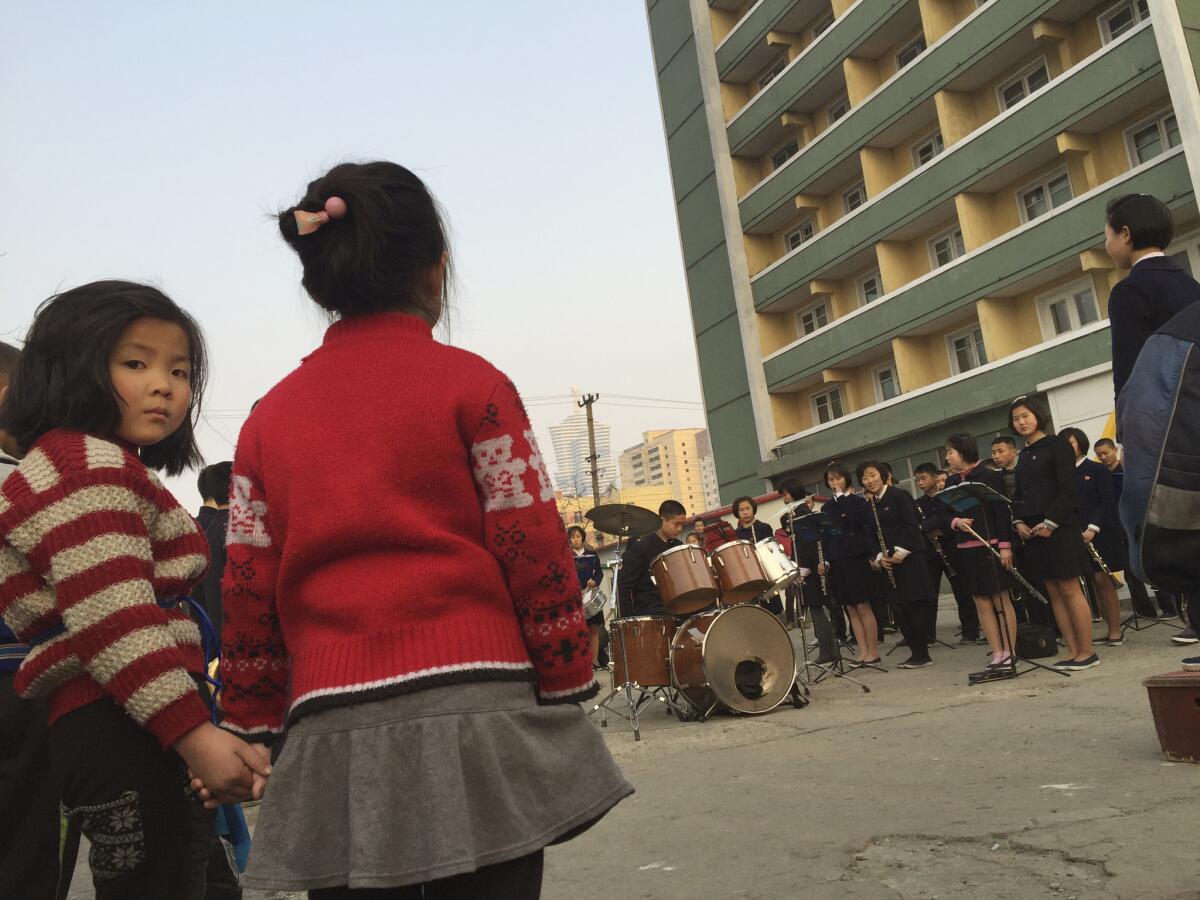North Korea tells its people famine is possible, may need to again ‘eat the roots of grass’

Girls watch schoolchildren play music to entertain and inspire people on their way home from work on March 29 in Pyongyang, North Korea. The government has called a loyalty drive before a ruling party congress in May.
- Share via
Reporting from Seoul — When Kim Jong Un made his first public speech as North Korea’s leader in 2012, he stood in front of a massive military rally in the capital’s main square and told the crowd that they would “never have to tighten their belts again.” Kim was referring to his country’s history of poverty and food shortages, particularly a famine in the 1990s in which hundreds of thousands of people — if not more — starved to death.
And just three months ago, Kim struck a similarly sunny note in his new year’s address, speaking of 2016 as a “golden age” during which North Korea would build “a thriving nation.”
But in wake of new economic sanctions imposed after its recent nuclear test, Kim’s regime seems to be changing its tune. This week, an official mouthpiece of the North Korean state made what appears to be the country’s first acknowledgment that it is preparing for worsening economic conditions.
“We may have to go on an arduous march, a time when we will again have to eat the roots of grass,” said an editorial in the Rodong Sinmun, the official newspaper of the ruling Workers’ Party of Korea.
The sanctions, which on paper are the most severe in 20 years, were approved by the U.N. Security Council after Pyongyang’s February nuclear weapons test and more recent long-range missile launch, actions banned by Security Council resolutions.
The sanctions are aimed at further restricting North Korea’s international trade and making it harder for the already cash-strapped country to make the money it needs to fund weapons programs. They go as far as to prohibit U.N. members from importing coal and iron from North Korea, two key exports for the reclusive state.
For decades, North Koreans have lived in poor conditions while their government has poured huge sums into weapons development, and the state has used the language of collective sacrifice when selling tough times to the populace.
“It’s an old pattern of telling the population to endure short-term hardship for the promise of larger benefits over the long term,” Daniel Pinkston, a lecturer at Troy University in Seoul, said of the Rodong Sinmun editorial.
“They’re betting that the harm of the sanctions won’t last and ultimately their nuclear weapons will make the country stronger,” Pinkston added.
The phrase “arduous march” is an allusion to the North Korean state’s claim that its founding leader, Kim Il Sung, led a guerrilla campaign against the Japanese Imperial Army, which occupied the Korean peninsula early in the 20th century.
It is now used as a euphemism for the famine that ravaged North Korea in the 1990s, after the country was hit by the loss of economic aid after the Soviet Union’s collapse. Things got worse in subsequent years when torrential rains wiped out crops, causing widespread starvation. North Koreans were told to struggle on, calling on the example of the fight Kim Il Sung led for Korean independence in the 1930s against the more numerous and better equipped Japanese.
The regime could be invoking this history to prime the populace for the Party Congress, which will be held in May for the first time in 35 years. At the Congress, Kim could announce changes in the ranks of the country’s leadership, and new policy directives.
Paik Hak-soon, an analyst at the Sejong Institute, a think tank near Seoul, said the editorial was “meant to mobilize people both materially and ideologically ahead of the Party Congress, which comes at a time when North Korea is facing both economic difficulties and tensions with South Korea and the U.S.”
Tensions have been high between the Koreas lately, with the U.S. and South Korea carrying out annual joint military exercises. This year’s are the biggest ever, a fact that has not gone unnoticed by Pyongyang. North Korea launched short-range projectiles off its east coast on Tuesday, the South Korean military reported, one of several such launches in recent weeks apparently aimed at signaling Pyongyang’s objection to the drills.
North Korea recently cut off economic cooperation with South Korea, shuttering a joint industrial park along the border.
The North Korean economy is in far better shape today than when famine hit in the 1990s, but Kim Jong Un hasn’t ushered in an era of prosperity as he pledged, analysts say.
“For the economy, Kim Jong Un’s tenure has been a mixed bag,” said Benjamin Katzeff Silberstein, a nonresident Kelly Fellow at the Pacific Forum Center for Strategic & International Studies. “On the one hand, he has shown a sense of pragmatism in acknowledging North Korea’s problems. On the other hand, no fundamental systemic changes have occurred.”
Kim took small steps toward addressing the problem of North Korea’s mostly state-planned economy by introducing agricultural reforms that allow some farmers to sell their surplus products, but such measures have not been widely implemented.
Silberstein also pointed out that Kim has been well aware of the need to keep North Korea’s elite content, by focusing on improving conditions in the capital Pyongyang and splurging on prestige projects like a luxury ski resort and water park. But with these projects concentrated in Pyongyang, they do little to improve the lives of the majority, the people who are being called on to tighten their belts.
Borowiec is a special correspondent.
More to Read
Sign up for Essential California
The most important California stories and recommendations in your inbox every morning.
You may occasionally receive promotional content from the Los Angeles Times.













